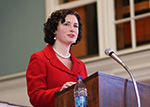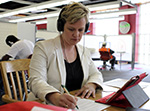Wabash College President Gregory D. Hess and Dean of the College Scott E. Feller announced the promotion and tenure of six faculty members. Professors Crystal Benedicks (English), Sara Drury (Rhetoric), Jeff Drury (Rhetoric), Jill Lamberton (English), Colin McKinney (Mathematics & Computer Science), and Laura Wysocki (Chemistry) all successfully completed the tenure process and will assume the rank of associate professor at the 184-year-old liberal arts institution.
“These talented teacher-scholars are fully involved at the College and engaged in all aspects of our students’ lives, including our Liberal Arts Plus initiatives and the summer Wabash Liberal Arts Immersion Program,” said President Hess.
Dr. Benedicks joined the faculty in the English Department in 2007 after serving as an assistant professor of English at the Queensborough College of the City University of New York in 2007-08. She earned her bachelor’s degree from the New College of Florida in 1998 and M.Phil. and Ph.D. degrees in English from the City University of New York in 2005.
 “When I first came here, in 2007 as a visiting professor, I had no idea what a special place I'd find,” said Benedicks. “Every scholar hopes to earn tenure as a career goal, but the longer I spent at Wabash and the more I got to know the remarkable young men who study here, the more I wanted to be part of this family. I'm honored to go on teaching, writing, and thinking alongside my talented colleagues and students.
“When I first came here, in 2007 as a visiting professor, I had no idea what a special place I'd find,” said Benedicks. “Every scholar hopes to earn tenure as a career goal, but the longer I spent at Wabash and the more I got to know the remarkable young men who study here, the more I wanted to be part of this family. I'm honored to go on teaching, writing, and thinking alongside my talented colleagues and students.
Benedicks’ academic interests center on writing, including composition, professional and grant writing; and literature, including poetry, short fiction, and issues of gender and sexuality.
“Crystal is admired by students as a caring teacher deeply committed to student success. Faculty are impressed with the way she seamlessly integrates her work as a teacher, scholar, and colleague around the important work of writing,” said Dean Feller.
Dr. Jeff Drury joined the faculty in the Rhetoric Department in 2013, having spent the previous five years as assistant professor in the Department of Communications and Dramatic Arts at Central Michigan University. He received his bachelor of arts (Organizational Communication/2001) and master’s (Political Rhetoric/2003) degrees from Northern Illinois University, and earned his Ph.D. (Political Rhetoric and Public Deliberation) from the University of Wisconsin in 2008.
“Robert F. Kennedy once told students that by attending college they ‘have been lifted onto a tiny, sunlit island while all  around you lies an ocean of human misery, injustice, violence, and fear,’” said Drury. “Earning tenure means that I can continue the College's mission to spread light in dark places. It reminds me of the privilege I have to teach at Wabash and of my tremendous opportunity and responsibility to educate young men.”
around you lies an ocean of human misery, injustice, violence, and fear,’” said Drury. “Earning tenure means that I can continue the College's mission to spread light in dark places. It reminds me of the privilege I have to teach at Wabash and of my tremendous opportunity and responsibility to educate young men.”
Drury focuses advocacy and public discourse, with particular interest in what political argumentation means for the role and value of citizen participation.
“Jeff is praised by students for setting high standards in the classroom and he sets high standards for himself in his scholarship and service,” Feller said. “He teaches students extensively outside the traditional classroom, for example in his work with the Parliamentary Union, his collaborative research with students, and his effective Chapel talk.”
Dr. Sara Drury joined the Wabash College Rhetoric Department in 2011 after serving as a Graduate Teaching and Research Assistant at Pennsylvania State University from 2005-10. She earned her B.A. in Political Science from Boston College in 2005, and her master’s and Ph.D. (Communication Arts and Sciences) from Penn State in 2007 and 2011, respectively. A member of Phi Beta Kappa, Drury also served as a Research Associate (2010-11) and Research Deputy (2014-16) for the Kettering Foundation.
 “Wabash is a college that values the liberal arts and works to promote it for each and every student,” said Drury. “I look forward to continuing the liberal arts tradition of Rhetoric at Wabash College. It is my privilege and honor to teach, research, and collaborate with faculty, staff, and students to identify, understand, and address the challenging public problems of the twenty-first century.”
“Wabash is a college that values the liberal arts and works to promote it for each and every student,” said Drury. “I look forward to continuing the liberal arts tradition of Rhetoric at Wabash College. It is my privilege and honor to teach, research, and collaborate with faculty, staff, and students to identify, understand, and address the challenging public problems of the twenty-first century.”
Drury’s academic interests include the theories and practices of democratic deliberation, presidential rhetoric, the rhetoric of national security, political campaigns, and the rhetoric of religion.
For the last four years, Drury has been the Director for the Wabash Democracy and Public Discourse Initiative, which advances the kinds of deliberation, discussion, debate, and advocacy that cultivate democracy. The WDPD has led deliberations and community discussions on campus, state-wide, and in locations across the country.
“Sara’s excellence is recognized across the Wabash campus and far beyond,” Feller said. “She has established a national reputation as an innovator in developing effective methods for civic discourse, a project that is centered on Wabash students and has benefitted our campus and our community as well as groups around the country.”
Dr. Lamberton joined the faculty in 2009 and has served as the Byron K. Trippet Assistant Professor of English since 2014. Previously, she was a visiting assistant professor of English (2009-13) and Rhetoric (2009-11). Lamberton earned her bachelor’s degree in English, Religion and Spanish from Walla Walla College in 1996, her master’s in English Studies from Western Washington University in 1998, and a Ph.D. in Rhetoric and Composition from the University of Michigan in 2007.
“I feel especially fortunate to have been granted tenure at a college where changing lives means much mor e than preparing students for a lucrative career,” said Lamberton. “English professor Anne Hall was recently quoted in the New York Times as saying that college should be a time and place to develop ‘the muscle of thoughtfulness, the use of which will be the greatest pleasure in life and will also show what it means to be fully human.’ I couldn’t agree more, and I am so grateful to have found in Wabash College a place where a dedicated staff and faculty teach and mentor students—both in and outside the classroom—in a way that calls them to grow into more thoughtful, confident, engaged human beings. Teaching at Wabash is much more than a job; it’s a vocation.”
e than preparing students for a lucrative career,” said Lamberton. “English professor Anne Hall was recently quoted in the New York Times as saying that college should be a time and place to develop ‘the muscle of thoughtfulness, the use of which will be the greatest pleasure in life and will also show what it means to be fully human.’ I couldn’t agree more, and I am so grateful to have found in Wabash College a place where a dedicated staff and faculty teach and mentor students—both in and outside the classroom—in a way that calls them to grow into more thoughtful, confident, engaged human beings. Teaching at Wabash is much more than a job; it’s a vocation.”
“Jill defines the term student-centered and thus serves as a role model for our entire campus,” Feller said. “A naturally gifted teacher, she continues to innovate in the classroom and in her scholarship. She has the complete trust of both her students and her colleagues.”
Dr. McKinney joined the faculty in the Department of Mathematics and Computer Science in 2011, having spent the previous academic year as visiting assistant professor of mathematics at Bradley University. He received his bachelor of science in mathematics from the University of Texas at Dallas in 2004 and his master’s and Ph.D. degrees in mathematics from the University of Iowa in 2006 and 2010, respectively.
 “Being granted tenure is an incredible honor,” said McKinney. “The entire Wabash community has been amazingly supportive and helpful, and so everyone really shares in this honor. I look forward to many more years of service here at Wabash.”
“Being granted tenure is an incredible honor,” said McKinney. “The entire Wabash community has been amazingly supportive and helpful, and so everyone really shares in this honor. I look forward to many more years of service here at Wabash.”
McKinney specializes in the history of mathematics, specifically ancient Greek mathematics, with emphasis on Papyri, Codices, and the manuscript tradition of Greek mathematical works; digitization and preservation of mathematical texts and its diagrams; the role of mathematical history and philosophy in mathematics education; and technology as a tool for teaching and visualizing mathematics.
“Colin has established himself as an effective and engaging teacher of mathematics and freshman seminars,” Feller said. “He models for students and colleagues a commitment to the ideals of liberal arts education that few can match. His intellectual curiosity shows in everything from robotics to his research into ancient mathematics.”
A member of Wabash’s Chemistry Department since 2011, Dr. Wysocki came to Wabash after serving as a Postdoctoral Associate at the Howard Hughes Medical Institute in Ashburn, VA, from 2008-11. She earned her B.A. in Chemistry from Northwestern University in 2003, and her Ph.D. in Organic Chemistry from the University of Wisconsin in 2008. A member of Phi Beta Kappa, Wysocki has been a mentor to 23 independent study or summer internship students since 2011.
“I am thrilled to earn my place among outstanding faculty colleagues who work closely with the students, alumni, and staff  to make Wabash College a challenging, thoughtful, rewarding, supportive, and special place to live, work, and learn from one another,” said Wysocki. “I look forward to many future collaborations in the classroom, the laboratory, and beyond.”
to make Wabash College a challenging, thoughtful, rewarding, supportive, and special place to live, work, and learn from one another,” said Wysocki. “I look forward to many future collaborations in the classroom, the laboratory, and beyond.”
Wysocki’s research focuses on the synthesis and study of fluorescent dye derivatives that can be used as sensors or enzyme substrates.
“Laura’s achievements in the organic chemistry classroom and research laboratory are widely known on campus,” Feller said. “She is admired by both students and faculty for the rigor and care that characterize her as a teacher and mentor. Beyond Hays Hall she is recognized as one of the most engaged members of our College community, supporting students in every aspect of their Wabash experience.”
These promotions are effective July 1, 2017.